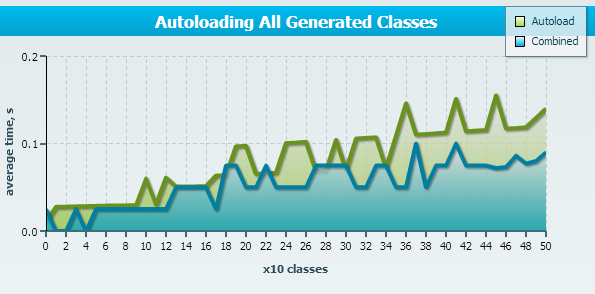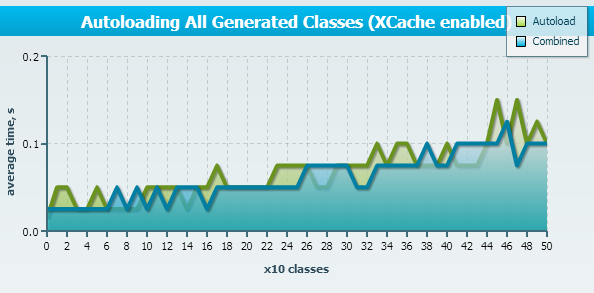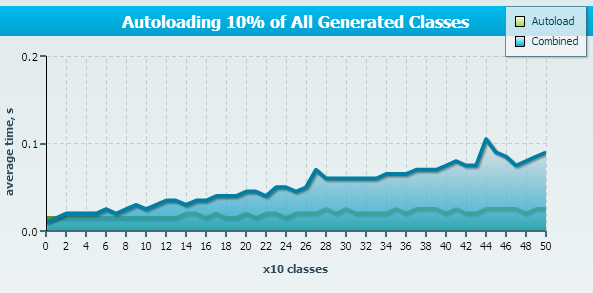Thinking about ways of further improving PHPixie I started looking at other projects for inspiration. For example the Fat-Free framework boasts on being contained in a single file. This got me thinking about making a tool for merging all project classes together with vendor libraries into a single for performance boost. MAking such a tool is a fairly trivial task, but still I wanted to be sure it would actually be usefull, so I decided to benchmark autoloading classes with composer vs combining them into a single file.
The setup was fairly simple:
1) Generate a set number of classes
2) Build a composer classmap for them to speed up autoloading
3) Combine them into a merged file
4) Benchmark the amount of time spent instantiating the classes
5) Repeat steps 1-4 for a number of classes ranging from 1 to 500
To generate classes that would simulate realistic IO each class would get a random number of methods with random number of lines in them. Finally the class generator would look like this:
1
2
3
4
5
6
7
8
9
10
11
12
13
14
15
16
17
18
19
20
21
22
23
24
25
26
27
28
29
30
31
32
33
34
35
function build_method($class,$i) {
$str = " function {$class}_{$i}() {\r\n";
for ($i = 0;$i<rand(15,30);$i++){
$str.= ' $i = '.rand(100, 200).' + '.rand(10, 90).";\r\n";
}
$str.= "}\r\n";
return $str;
}
function build_header() {
$str="<?php\r\n";
$str.= "namespace A;\r\n";
return $str;
}
function build_class($i){
$extends = $i%10 > 0?"extends A".($i-1)." ":"";
$str= "class A$i $extends{\r\n";
for($j = 0; $j < rand(4, 9); $j++)
$str.= build_method("A$i", $j);
$str.= "}\r\n";
return $str;
}
$merged = "";
for($i=0;$i<$argv[1];$i++){
$class = build_class($i);
$merged.=$class;
file_put_contents( __DIR__."/A/A{$i}.php", build_header().$class);
}
file_put_contents( __DIR__."/merged.php", build_header().$merged);
To add even more realism I made it so that some classes are children of other classes, this way instead of instantiating every class to load it, I can just instantiate classes A9 and A19 to load all classes from A0 to A19 in 2 calls. From here it was just a matter of setting up 2 php, files, one that would execute testcases using autoloaded clasess, the other using the merged ones.
So here are the results:

Benchmarking loading of all generated classes for each test
As wee can see on the first chart, with XCache disabled the Combined approach outperforms Autoloading as the number of classes increases, which is quite logical, the performance difference is about 0.03ms with 500 classes which is really negligible. Now let’s try turning XCache on:

Loading classes with opcache enabled
Xcache pretty much levels everything by caching the opcodes, thus negating any reason to combine classes into a single file. I’ll go even further and prove that combining classes into a single file will actually hurt performance. The reason being is that in both tests we loaded all of the project classes, this doesn’t happen in real life though.
If you have a large project that has lots of different logic in it I’d say that on each request only about 10% of all project libraries are needed. In this case autoloading will work much faster, since it doesn’t load useless code and hog memory like the combined approach would.
So here is my final benchmark. For this one I load only 10% of generated classes (so for 500 generated classes in a test only 50 are being used):

Loading only 10 percent of generated classes
As we can see Autoloading dramatically outperforms the merged file approach. Now I don’t mean to say that Fat-Free isn’t a fast framework, I just think that this particular aspect of it isn’t really usefull. So I guess PHPixie will not be getting a “combine your classes into a single file” tool after all.
So is there anything that we still can do to improve autoloading performance? Yes! We can use composer properly.
1
2
3
4
5
6
$loader = require 'vendor/autoload.php';
//This is the WRONG approach
//because adding your files like this
//you won't benefit from the classmap cache
$loader->add('Acme\\Test\\', __DIR__ );
The correct approach is to put this in your composer.json:
1
2
3
4
5
6
7
8
9
{
"autoload": {
"psr-0": {"": "classes/"}
},
}
//Now if you run "php composer.phar update -o"
//A classmap cache will include your project files too
//thus (slightly) boosting autoload speed